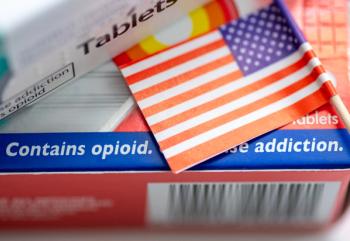
Ajovy Demonstrates Safety, Efficacy in Pediatric Migraines
The calcitonin gene-related peptide monoclonal antibody significantly reduced the number of monthly migraine days.
Results of a phase 3 clinical trial have demonstrated the safety, efficacy, and tolerability of fremanezumab (Ajovy) in children and adolescents with episodic migraine, according to a late-breaking abstract presented at the 18th European Headache Congress, held December 4 to 7 in Rotterdam, The Netherlands.1
Investigators presented results of the multicenter, randomized, double-blind, placebo-controlled, parallel-group, phase 3 SPACE clinical trial (
“Over the last 30 years, the incidence of childhood
“This is a significant step forward for the care of migraine in children and adolescents who are having to live with this high burden,” Hughes continued.
The study cohort included 234 participants with a migraine diagnosis 6 months or older and a history of fewer than 14 headache days per month who were randomly assigned 1:1 to receive either monthly fremanezumab (120 mg for participants less than 45 kg, 225 mg for participants more than 45 kg) or placebo for 12 weeks (fremanezumab n=123, placebo n=111). The primary endpoint was least-squares mean change from baseline in average month migraine days during the study’s double-blind period.
Study results showed that fremanezumab significantly reduced the number of monthly migraine days vs placebo over a 3-month period (-2.5 days vs -1.4 days), with least-squares mean changes favoring fremanezumab when stratified by age and sex, and the reduction in monthly headache days of at least moderate severity was also significantly greater in the fremanezumab group (-2.6 days vs -1.5 days). The 50% response rate was also higher in the fremanezumab group (47.2% vs 27%).
READ MORE:
Adverse event reports were similar across both groups, with 55% and 49% in each group reporting at least 1 adverse event. The proportion of participants with serious adverse events and adverse events leading to discontinuation (≤3% and <1%, respectively) were also low.
These efficacy and safety results are consistent with data observed in adult populations, according to a news release from manufacturer Teva Pharmaceuticals.2
The overall estimated prevalence of migraine among children is 7.7%, with a prevalence of 5% in children aged 5 to 10 years increasing to approximately 15% in adolescents. As with adults, migraine can cause significant disability and is associated with absences from school, impaired educational performance, and missed social activities.
“This is an important milestone for clinicians and young patients living with episodic migraine who currently have [few] treatment options available to them,” said Patricia Pozo-Rosich, Headache Unit and Research Gropu, Head of Section Neurology Department at the Vall d’Hebron Hospital and Research Institute in Barcelona, Spain. “This is the first phase 3 trial of a CGRP-pathway treatment that has shown statistically superior efficacy with favorable safety and tolerability for the prevention of episodic migraine in children and adolescents.”
Teva is continuing research into the use of fremanezumab in pediatric patients with chronic migraine, and to understand the drug’s long-term safety.
Fremanezumab is currently FDA approved as a prophylactic migraine therapy in adults who have at least 4 migraine days per month. It can be administered either once monthly as a 225 mg subcutaneous injection, or every 3 months at 675 mg in 3 subcutaneous injections.
READ MORE:
References
Hershey AD, Szperka CL, Barbanti P, et al. Efficacy and safety of fremanezumab for the preventive treatment of episodic migraine in children and adolescents: a phase 3, randomized, double-blind, placebo-controlled study. Presented at: 18th European Headache Congress; December 4-7, 2024; Rotterdam, The Netherlands. Abstract LP036.
Teva presents positive efficacy and safety data of Ajovy (fremanezumab) for the prevention of episodic migraine in children and adolescents from phase 3 SPACE trial. News release; Teva Pharmaceuticals. December 4, 2024. Accessed December 5, 2024.
https://www.biospace.com/press-releases/teva-presents-positive-efficacy-and-safety-data-of-ajovy-fremanezumab-for-the-prevention-of-episodic-migraine-in-children-and-adolescents-from-phase-3-space-trial
Newsletter
Pharmacy practice is always changing. Stay ahead of the curve with the Drug Topics newsletter and get the latest drug information, industry trends, and patient care tips.























